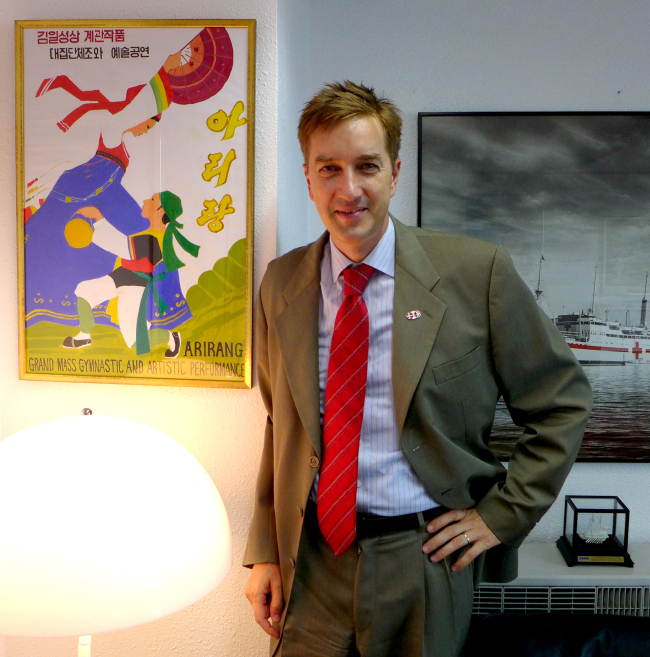The international community must sustain its humanitarian assistance to the people of North Korea, while pressing the regime to improve its dismal human rights situation, Danish Ambassador Thomas Lehmann said after a five-day visit in late May.
Denmark maintains diplomatic relations with South and North Korea, but does not have an embassy in Pyongyang. The Nordic nation is one of 21 countries ― mostly European ― that have a diplomatic presence in Seoul while maintaining official ties with Pyongyang.
In an effort to increase the “minimal” trade and investment between Denmark and North Korea, the communist bureaucrats asked Lehmann to visit often, the ambassador told The Korea Herald last week at the embassy.
 |
Danish Ambassador Thomas Lehmann poses beside an Arirang Mass Games poster he obtained on a visit to North Korea in late May. Joel Lee/The Korea Herald |
Lehmann presented his ambassadorial credentials to Kim Yong-nam, North Korea’s chairman of the Supreme People’s Assembly, and met Kung Sok-ung, vice foreign minister in charge of European affairs, alongside other diplomats.
The ambassador visited Pyongyang and Sariwon, the North Hwanghae
Provincial capital south of Pyongyang.
“They wanted to showcase Pyongyang’s economic development over the last 10 years, with new apartments, restaurants, cafes, hotels and malls,” he said.
“There was a good deal of market activity, although stark differences existed between the residents ― those with access to privileges and goods, and those struggling to get by.”
Residents streamed down the streets in Pyongyang on bicycles much the same as Danes do in Danish cities, though only men rode bicycles in Pyongyang while both men and women did in Sariwon, Lehmann said.
In Sariwon, he visited orphanages where the World Food Program has been operating hunger reduction programs, which are also run in schools.
Denmark donated $100 million last year to multilateral organizations, of which $40 million went to the WFP. It spends 0.83 percent of its gross domestic product on official developmental aid, well above the United Nations’ recommended rate of 0.7 percent, the ambassador pointed out.
“As a developed and wealthy country, we have always had a strong presence in foreign aid,” Lehmann highlighted, adding that development assistance has been a key part of Denmark’s foreign policy.
Despite the proliferation of markets in North Korea following the devastating famine of the 1990s, Lehmann said that many North Koreans struggle in their daily lives, with most activities carried out manually.
Electricity was cut regularly throughout the day, and people had set up solar panels on balconies to get extra power, Lehmann recalled. Construction in Pyongyang heavily relied on physical labor, with workers lifting concrete and equipment up and down the floors; nearly all work in the countryside relied on brawn.
Despite analyses that the drought is unlikely to create a nationwide famine, Lehmann, based on firsthand observation, described the situation as “very serious.”
“I saw long lines of children manually pouring water onto the farm fields in bottles, going back and forth between the well and paddies,” he said. “There was no mechanized system of irrigation, and water levels in dams have dropped, creating hydropower shortages.”
The ambassador said he saw potential in developing renewable energy in North Korea, using solar energy, which is already being used by Pyongyangers; wind energy, based on Danish companies’ success in South Korea; and biomass energy, by turning urban and agricultural waste products into “green electricity” through bio-refineries.
“But all of it requires a high level of investment and technology,” he added.
The Danish government’s key foreign policy for the Korean peninsula is peace and security, Lehmann stressed, adding that his country condemned Pyongyang’s nuclear development and human rights violations.
“It is very sad and unfortunate that Korea is the world’s last Cold War region with a national division,” he said.
“Denmark welcomes the opening of a U.N. field office in Seoul to track the North’s human rights. We also supported the European Union’s resolution at the U.N last year, urging the country’s referral to the International Criminal Court for crimes against humanity.”
By Joel Lee (
joel@heraldcorp.com)








